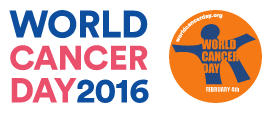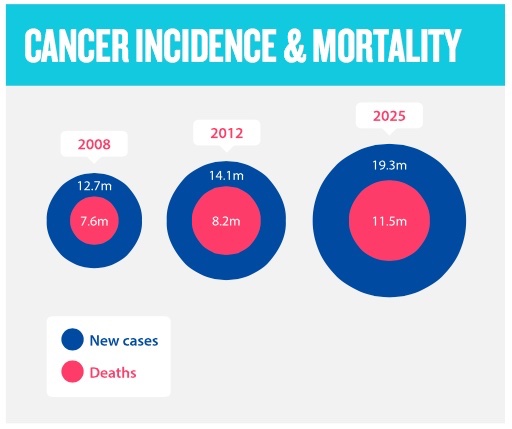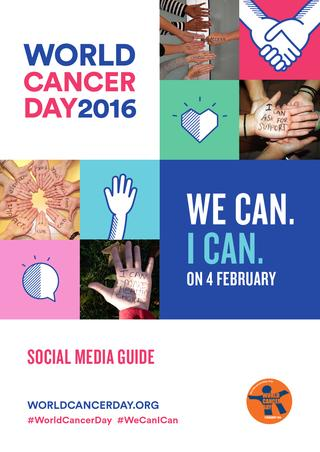 World Cancer Day (WCD) was established by the Paris Charter adopted at the World Summit Against Cancer for the New Millenium in Paris in 2000. The charter sets as objectives promoting the research for cures as well as cancer prevention, upgrading provided services to cancer patients, raising public awareness, and mobilization of the global community against cancer. In its charter, Feb. 4 was established as the day World Cancer Day would be recognized.
World Cancer Day (WCD) was established by the Paris Charter adopted at the World Summit Against Cancer for the New Millenium in Paris in 2000. The charter sets as objectives promoting the research for cures as well as cancer prevention, upgrading provided services to cancer patients, raising public awareness, and mobilization of the global community against cancer. In its charter, Feb. 4 was established as the day World Cancer Day would be recognized.
In recognition of WCD 2016, the American College of Chest Physicians (CHEST) is joining the Forum of International Respiratory Societies (FIRS), in supporting the World Cancer Day: ‘We Can. I Can’ campaign that FIRS is also using the day to highlight.
WCD 2016-2018 will be taking place under the theme of ‘We can. I can.’, an initiative to highlight and explore how everyone, collectively or as individuals, can participate in helping reduce the global burden of cancer, noting that as cancer affects everyone in different ways, all people have the power to take various actions to reduce the disease’s impact on individuals, families, and communities.
 (Image courtesy World Cancer Day)
(Image courtesy World Cancer Day)
“On World Cancer Day, we have an opportunity to collectively examine cancer control strategies to identify winning formulas that will accelerate progress. The goal for all of us is to ensure fewer people develop cancer, more people are successfully treated and that there is a better quality of life for people during treatment and beyond,” said Heather Bryant, vice president of cancer control of the Canadian Partnership Against Cancer and listed in the Top 100 of the Women’s Executive Network (WXN) 2015 of Canada’s Most Powerful Women.
WCD organizers note that over the next year alone, nearly 9 million people are likely to die of cancer, and that if left unchecked, mortality from cancer will increase to 13 million deaths per year by 2030. They suggest that WCD is an opportunity to reflect on what one can do: make a pledge and take action, affirming that whatever one chooses to do, ‘We Can. I Can.’ will make a difference to the fight against cancer.
 (Image courtesy World Cancer Day)
(Image courtesy World Cancer Day)
The initiative sets nine targets to be achieved by 2025 with the overarching goal being to reduce cancer deaths by 25 percent by 2025. The campaign targets include strengthening healthcare systems; measuring the cancer burden and impact of cancer plans in all countries; reducing exposure to cancer risk factors; universal coverage of HPV and HBV vaccination; reduction of stigma and dispelling myths about cancer; universal access to screening and early detection for cancer; improvement in access to services across the cancer care spectrum; universal availability of pain control and distress management; and improved education and training of healthcare professionals.
According to the World Health Organization, lung cancer is the most common cancer worldwide, with 1.8 million new cases recorded in 2012, and responsible for nearly one in five deaths. Tobacco smoking is widely acknowledged as the single greatest risk factor for lung cancer, but WCD partners say there needs to be wider understanding that regular exposure to secondhand smoke also increases lung cancer risk, as does environmental exposure to radon, asbestos, arsenic, beryllium, and uranium.
Risk of lung cancer also increases with a history of cancer in another part of the body, age, family history, radiation to the chest area, and lung diseases like chronic obstructive pulmonary disease (COPD) and tuberculosis.
 “We welcome occasions such as World Cancer Day to raise awareness of lung cancer, the most common cause of cancer deaths globally. Providing information to the public to aid in reduction of exposure to cancer risk factors, improving access to services across the cancer care spectrum, and strengthening health systems are all critical to improving lung cancer care and decreasing mortality,” said Prof. Michiaki Mishima, president of FIRS, in a press release.
“We welcome occasions such as World Cancer Day to raise awareness of lung cancer, the most common cause of cancer deaths globally. Providing information to the public to aid in reduction of exposure to cancer risk factors, improving access to services across the cancer care spectrum, and strengthening health systems are all critical to improving lung cancer care and decreasing mortality,” said Prof. Michiaki Mishima, president of FIRS, in a press release.
The Forum of International Respiratory Societies (FIRS)
FIRS was established in 2001, with members coming from a number of international societies, including Asociacin Latinoamericana del Thorax (ALAT), the American College of Chest Physicians (CHEST), the American Thoracic Society (ATS), the Asian Pacific Society of Respirology (APSR), the European Respiratory Society (ERS), the International Union Against Tuberculosis and Lung Disease (The Union), and the Pan African Thoracic Society (PATS).
The goal of FIRS is to unify and enhance efforts to improve lung health through the combined work of its more than 70,000 members globally, and to promote advocacy in matters of global respiratory health and identification of new areas for global initiatives
The American College of Chest Physicians (CHEST)
CHEST is a global leader in advancing patient outcomes through innovative chest medicine education, clinical research, and team-based care. With more than 18,700 members representing 100-plus countries around the world, CHEST’s mission is to champion prevention, diagnosis, and treatment of chest diseases through education, communication, and research. CHEST’s philanthropic arm, the CHEST Foundation, provides members with grants, patient education tools, and other resources to help their patients live and breathe easier.
For more information, visit:
http://www.worldcancerday.org/about

